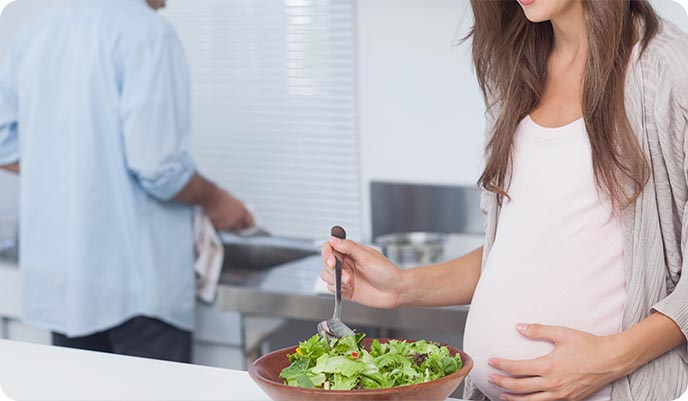Finding out that you’re pregnant is one of life’s greatest joys. You’ve told your partner and your family, you’re basking in the bliss and excitement – and then the nausea hits.
It may be called ‘morning sickness’ but the truth is it can actually happen any time of day (or night) Although not everyone will go through it, morning sickness is very common for women who are early in their pregnancy and usually – thankfully! – goes away after the third trimester. You may experience nausea but no actual vomiting, which is also totally normal.
WHY DOES MORNING SICKNESS HAPPEN?

So, why does it happen? The truth is, we’re not entirely sure, but it’s thought to be to do with the hormonal changes that your body goes through in the first 12 weeks of pregnancy. You may be slightly more likely to experience morning sickness if:
- It’s your first pregnancy
- You’re having twins or triplets
- You’ve had morning sickness during a previous pregnancy
- You suffer from migraines
- Other women in your family have had morning sickness
The important thing to remember is that morning sickness is completely natural and that it won't harm your baby. In fact, it’s often a good sign, as it means your hormones are at a healthy level.
For a very small number of women – around 1% – they can experience a more severe form of morning sickness called Hyperemesis Gravidarum. If you’re suffering from particularly bad sickness, make sure to err on the side of caution and speak to your GP, as there is plenty of support available.
There’s no sure-fire cure for morning sickness, but don’t panic – there are plenty of ways to manage it. With a few tweaks to your diet and lifestyle, you can help ease the nausea and feel more in control of your morning sickness.
WHAT SHOULD I EAT IF I HAVE MORNING SICKNESS?

The real question is, what do you WANT to eat? Your sense of smell is enhanced during the first three months of pregnancy, meaning that even foods you previously couldn’t get enough of can now turn your stomach. Your focus should be on finding things you actually feel like eating.
However, there are some tried-and-tested foods that are often recommended if you’re going through morning sickness. Ginger is probably the most well-known remedy, as it’s great for nausea, so sipping on flat ginger ale or ginger tea or snacking on crystallised ginger can help ease it. We know what you’re thinking - unfortunately, ginger biscuits don’t contain enough ginger for them to have an effect on nausea, but don’t let that stop you if you fancy a few!
If the thought of eating ginger isn’t working for you, plain, bland foods could do the trick, including plenty of carbs. Bread, rice, pasta, potatoes and crackers can be easier to eat when you’re feeling sick. Eating little and often rather than having big meals is often helpful and eating cold foods can help control your gag reflex, as they don’t smell as strongly as hot dishes. For many women, foods that are overly flavoured, spicy or sweet are a big no-no during morning sickness, but if you’re craving them, go for it! Just focus on eating what works for you.
WHAT SHOULD I BE DRINKING TO HELP MORNING SICKNESS?

Many of us are guilty of falling short of our recommended eight glasses of water a day anyway, but when you’re suffering from morning sickness it can feel like a monumental task. Even if you’re struggling to keep food down, it’s really important to stay hydrated.
You don’t need to be downing pints of water at a time, but sipping them little and often can help ease nausea and stop you getting dehydrated. Some women find that tepid water can make them gag, so try it ice cold and see if that helps. If you’ve been vomiting a lot, sports drinks or oral rehydration sachets can help replenish lost electrolytes.
WHAT COULD BE TRIGGERING MORNING SICKNESS?

It may seem like the nausea is coming on randomly – and it definitely could be – but there also could be a bit of a pattern to your sickness. If you’re finding your stomach is turned at midday when you can smell food being cooked, that could be a trigger. Feeling queasy when you kiss your partner goodbye in the morning? It might be time to tell them to skip the aftershave.
By tuning in to your surroundings, you might find that there’s a surprising correlation between your routine and your sickness, so it’s worth looking out for triggers so that you can find ways to avoid them when possible.
I’ve changed my diet – what else can I try?
Now’s the time to break out your baggiest, comfiest clothes! Avoid wearing anything that’s tight around your waist and stomach, as you might find the pressure makes you more nauseous.
Remember those seasickness wristbands that people buy to take on cruises? Turns out they can be a great way to ease morning sickness for some women! Acupressure wristbands gently press down on a pressure point in the wrist that’s thought to be linked to nausea and sickness, so they are worth considering.
Tiredness can make nausea worse, so make sure that you’re getting plenty of rest and are putting your feet up whenever possible. After all, your body is doing some amazing but hard work right now – you deserve a break!
If you’re worried about your morning sickness, be sure to visit your GP for a little peace of mind. Remember, as long as you’re eating and drinking when you can, morning sickness won't harm your baby. You have plenty of time during your pregnancy to ensure you’re eating a healthy, balanced diet, so for now, keep doing the best you can.
If you’d like a few more tips to help support you through your pregnancy and beyond, take a look at our everyday advice page.
Related posts
Metanium Nappy Rash Ointment is a medicine. Always read the label.




